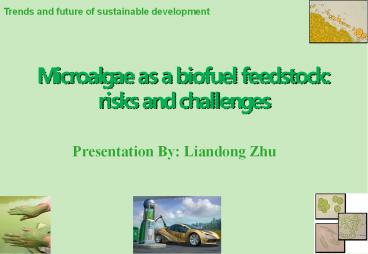Microalgae as a biofuel feedstock: risks and challenges - PowerPoint PPT Presentation
Title:
Microalgae as a biofuel feedstock: risks and challenges
Description:
Microalgae as a biofuel feedstock: risks and challenges Presentation By: Liandong Zhu Introduction Purpose and perspective Potential risks and challenges Conclusions ... – PowerPoint PPT presentation
Number of Views:1052
Avg rating:3.0/5.0
Title: Microalgae as a biofuel feedstock: risks and challenges
1
Microalgae as a biofuel feedstock risks and
challenges
Trends and future of sustainable development
- Presentation By Liandong Zhu
2
Contents
3
Introduction
- Energy crisis
- Based on the current consumption of about 11.6
million tons of crude oil per day, it is expected
that the entire resources can only suffice for a
rather short time period - UK Energy Research Centre even concluded that oil
resources will be used up between 2020 and 2030 - New oil and gas reserves are always discovered
- Global warming and global climate changes
- The use of oil can cause the risks of the rise of
greenhouse effect, which can result in all kinds
of disasters to our planet Earth and its
inhabitants
4
Introduction
Microalgae have overwhelmingly received a lot of
attention as a new biomass source for the
production
- High photosynthesis efficiency and can grow very
fast - Without occupying farmlands
- Can be supplied by saline and brackish water,
seawater, wastewater, and other salt water like
saline groundwater and CO2 by combustion gas - Can be collected very quickly
- Uniform cell structure with no bark, stems,
branches - or leaves
- Physical and fuel properties of biofuel (e.g.
density, heating value, etc.) are comparable to
those of fuel diesel.
5
Introduction
Where can we get algae?
6
Introduction
Where can we get algae?
7
Introduction
Products biodiesel, bioethanol, biohydrogen,
biogas
8
Purpose and perspective
- Microalgae-based biofuel (MBB) industry is
booming. But there is limited and fragmented
published information available on the
environmental, social, cultural and economic
dimensions involved with potential sustainable
risks.
- From sustainability perspective, this paper
explores the potential risks and challenges
connected with the production of MBB,
systematically. - Afterwards, some corresponding recommendations
about government policies, company behaviors and
public participation are put forward in order to
minimize the potential risks to the permitted
levels.
9
Potential risks and challenges-Environmental
- Water
- Water resource abuse
- Without feasible water usage planning
(recycling) - Damage to waterways
- Systems discharge (toxicants) chemical
additives, - flocculants, solvents, and catalysts
- Groundwater may not be recharged effectively
- Waterproof surface
10
Potential risks and challenges-Environmental
- Land
- Land use overexpansion
- Amount of space is required Over-pursue
- commercial profits cause an indirect land use
- Earth pollution, and soil erosion
- Discharge pollution Heavy rain or flood might
lead to - high biomass overflow Pipelines construction
- involves the removal of plenty of rocks and
earth
11
Potential risks and challenges-Environmental
- Biodiversity
- Eutrophication
- Downstream discharge leads to nutrient
imbalance - Algal blooms and fish kills
- Caused by eutrophication
- Biological invasion
- Downstream carries non-harvested microalgae
cells
12
Potential risks and challenges-Environmental
- Greenhouse gas
- Greenhouse gases (e.g. NOx, CH4) emissions
- Appearance of anaerobic zone under water
surface - and biomass death can bring about the emission
of - CH4, N2O, etc.
13
Potential risks and challenges-Economic
- Start-up is expensive (overwhelming investments)
- Capital costs occupy about 50 of the total
costs - Loss of jobs
- Development of increased automation
14
Potential risks and challenges-Social
- Jeopardize the health of local wildlife and
people - Pollution
- Diseases (e.g. yellow fever, malaria) spread
- Microalgae may provide some habitats for laying
- and hatching of mosquito eggs and larvae
15
Potential risks and challenges-Cultural
- Difficult for people to adapt to
- Traditionally used to produce cosmetics and
food - Microalgae biomass is a very new biofuel type
16
Conclusions
17
Recommendations
- Efficient government policies
- e.g., roles and responsibilities within
government agencies must be clarified contracts
of environmental impact statements must be
reinforced regulatory industry roadmap must be
developed propaganda activities - Proactive company behaviors
- e.g., water and land use planning should be
carried out in an environmental friendly manner
assessment of potential risks should be conducted
prior to facilities introduction require
transparency of process inputs and outputs.. - Positive public participation
- Public perception, sense and participation
18
Thank you for your attention!































